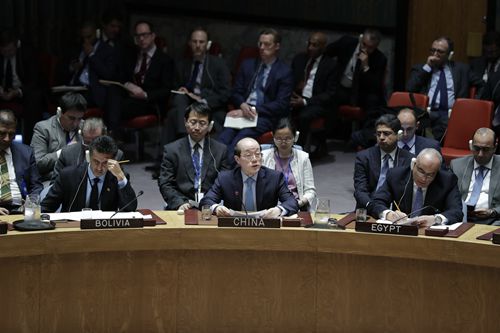| Statement by Ambassador LIU Jieyi at the Security Council Briefing on UN Peacekeeping Operations |
| 2017-04-06 22:26 |
|
China welcomes the initiative of the United States to convene this meeting. We thank Secretary-General Guterres for his briefing and for his nine reform points. China supports the Secretary-General’s important efforts to enhance United Nations peacekeeping operations. In the 70 years since their establishment, United Nations peacekeeping operations have played an important role in the maintenance of international peace and security. Given the profound changes in the international situation and the increasing complexity of peacekeeping environments and missions, the effective implementation of peacekeeping operations is facing grave challenges. The international community has high expectations for improving United Nations peacekeeping operations, and in this respect I wish to share the following observations. First, it is key to abide by the basic principles of peacekeeping operations and to handle relations with the host country appropriately. The purposes and principles of the Charter of the United Nations and the principles of the consent of the parties, impartiality and the non-use of force except in self-defense or defense of the mandate, otherwise known as the three peacekeeping principles, form the cornerstone of peacekeeping operations and retain an irreplaceable guiding role in the new context. In carrying out peacekeeping operations, it is important to fully respect the sovereignty of the host country and value its views, assist it in enhancing its security capacity-building, and engage in beneficial interaction with it. When a host country requests and the situation allows for the exit of a peacekeeping operation, the Security Council should guide the Secretariat in establishing a clear exit timetable, so as to avoid an indefinite stay on the part of the peacekeeping operation in the host country. Peacekeeping operations must adapt to changing dynamics and adjust their size as appropriate, so as to optimize peacekeeping resource flows and provide tangible assistance to countries with more pressing needs. Secondly, peacekeeping operations must have clear, actionable and focused mandates. Such operations revolve around the core tasks of conflict resolution and keeping peace. It is important to plan the mandates of peacekeeping missions with full consideration given to the actual needs of the host country, the security environment on the ground and the capacity of the troop-contributing countries (TCCs), as well as other factors, while adapting its priorities and focus to changing situations at every stage of the mission. The Secretariat must proceed from the overall perspective and in the long-term interest of maintaining international peace and security, take effective measures to improve the command system for peacekeeping operations, enhance missions’ work by improving their efficiency and efficacy and strengthen their ability to respond to complexities so that they can better perform the duties entrusted to them by the Charter of the United Nations. Thirdly, enhanced communication and coordination with the TCCs is necessary, as they are the main players in peacekeeping operations and have made major contributions and sacrifices to such operations. Peacekeepers from the TCCs have been performing their duties on the front lines and are best informed as to the challenges and difficulties facing them in the fulfillment of their tasks. The Security Council should enhance communication with TCCs and receive in-depth knowledge of the progress made by peacekeeping operations, the situation in the host country and the difficulties facing TCCs. It must fully respect the views of TCCs and take active measures to enhance the safety and security of peacekeepers and strengthen early-warning capacities with respect to potential security threats, as well as provide enough logistical support to ensure that security and medical equipment, supplies and measures are available. Nine of the 16 United Nations peacekeeping missions are located in Africa. Twelve of the top 20 TCCs are African countries. Enhancing communication and coordination with African countries in the field of peacekeeping and increasing assistance to African countries are imperative in order to effectively improve peacekeeping operations. In recent years, the African Union has been actively committed to more unified and stronger Africa, and has achieved considerable success in self-reliant peacekeeping efforts. China has always supported Africa in resolving African issues in African way. China has always supported the African Union and other regional and subregional organizations in their efforts to play active roles in the resolution of regional issues. China supports the United Nations in further expanding and deepening its cooperation with the African Union in the area of peace and security, while listening carefully to the views and concerns of African countries on peacekeeping and actively supporting Africa’s peacekeeping capacity-building. Over the years, African Union-led peacekeeping operations have played a crucial role. The United Nations should increase its political support to them, provide greater assistance in the areas of staff training, logistical assistance and financial support and give positive consideration to setting up a sustained and stable funding mechanism. As the largest TCC among the five permanent members of the Security Council and the second largest contributor in terms of assessed contributions to United Nations peacekeeping budget, China has made an important contribution to the cause of United Nations peacekeeping. China is implementing across the board all of the commitments announced by Chinese leaders to further support United Nations peacekeeping operations by actively building up a stand-by peacekeeping force, vigorously advancing the dispatch of helicopters and providing training to peacekeepers from around the world, African countries in particular. China will work to facilitate the China-United Nations Peace and Development Fund’s ability to take more concrete action to benefit developing countries, especially African countries, and help Africa to enhance its peacekeeping capacity-building. China is ready to work together with the broader United Nations membership and make a greater contribution to further improving United Nations peacekeeping operations and better maintain international peace and security. |
| |||||||||||||
| |||||||||||||
